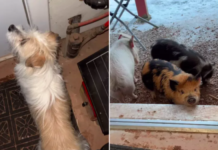Last Updated on February 9, 2024 by Fumipets
Guiding Principles: Unveiling 5 Commandments of Responsible Pet Ownership
Through the years, pets have gone from well-trained domesticated animals to valued members of the family. In fact, pet ownership has evolved into pet parenthood, where people consider cats, dogs, and other animals their “children.”
As a parent, you are responsible for providing the best possible care for your child. The same goes for pets.
Whether you are a new pet parent or are planning to become one, there are several things you must remember to perform the role well. Heed the following five commandments to a straight path at responsible pet ownership:
Commandment #1: Thou shalt understand the commitment to thy pet.
Having a pet is a decision not everyone chooses to make. Even those who do may not take similar paths when it comes to the kind of furry pal to adopt and how to raise them.
Like individual families, owners and their pets will have unique relationships. But whatever the case for you and your new furry baby, you must first determine whether you are ready for the commitment.
Be completely honest and answer the following questions:
- Are you willing to spend money on dry dog food, grooming tools and services, vet check-ups, and safety gear?
- Will you commit to walking your dog or playing with your cat every day?
- Can you take the time to be there for them not just physically but emotionally as well?
If you answered “yes” to all these questions, you can now proceed to pet selection.
Consider the type of pet that matches your lifestyle. Before selecting a breed, be sure to factor in all the aspects of your life: family, activities, hobbies, and personality.
Commandment #2: Thou shalt respect thy pet.
Like people, animals are different from one another. Despite this, you need to understand that all pets are special and deserve respect and compassion.
To become a good pet owner, respecting your four-legged pal will help you develop a sense of responsibility to provide the best possible care for them.
That means you must give them enough time to adjust to life with you. Respect for pets also offers you a better perspective, making it possible to set reasonable expectations about what pet ownership entails.
It doesn’t matter if your pet came from a shelter or a rescue centre; they all deserve the same level of respect as other animals. Your role is to be their loving caregiver and the leader of a happy human-animal relationship.
Commandment #3: Thou shalt provide a safe and nurturing environment for thy pet.
A safe and nurturing environment for pets has several characteristics. First, it provides all the animal’s basic needs, including shelter, food, water, and social interaction. This includes pet grooming, too.
Next, it is a safe space for the pet. You need to pet-proof your home before they arrive. This means you have to:
- Know what foods and household products may harm them.
- Keep those harmful substances away from your pet.
- Move any breakables and “chewable” items out of their reach.
- Secure electrical cords and outlets to keep curious noses and paws safe.
- Cordon off any garden or house plants that are toxic for pets.
This also means you must never put your pet in any situation that may lead them to harm. For example, if you decide to adopt a dog, you must never chain them out in the backyard if you live somewhere with a predator problem.
Commandment #4: Thou shalt discipline and train thy pet with care.
Teaching discipline is an important part of pet parenthood. However, there might be times when you feel bad about it, thinking you might have been too harsh on your furry bundle of joy.
But don’t fret; as long as you don’t cause them physical harm, chances are you’re doing a good job. Just remember to avoid the following “methods” of discipline:
- Beating
- Starving
- Withholding affection for extended periods
You should also avoid punishing your pet for things that they cannot control. In this case, you may need to investigate further why your buddy acted the way they did. Extend your patience and compassion, and you will do just fine.
The bottom line is to create a safe and structured home for your pet.
Commandment #5: Thou shalt keep thy pet healthy and happy.
Like people, pets must have several basic necessities to thrive: food, water, and exercise. They also need proper hygiene and regular check-ups.
Food
Make sure you only feed your pet healthy food. Seek recommendations and advice from your vet, especially if you’re unfamiliar with a particular breed’s needs.
Some of the factors that affect your pet’s ideal diet include:
- Age
- Weight
- Activity level
You can also use the instructions on the pet food packaging to determine the correct serving size for your furry baby.
You may also need to control feeding times rather than just letting them graze the entire day. Establish a routine for mealtimes, which can be set either once or twice daily.
If you have a dog (or plan to adopt one), monitor the treats they get as well. If they do get more than usual as a reward, be sure to adjust their meals accordingly.
Water
Water is essential for all types of animals. Aside from providing hydration, it also aids in digestion, body temperature regulation, and overall health.
Make sure your pet gets fresh, clean water throughout the day and even at night. If you go on outings and car trips, don’t forget to bring water for them.
Don’t forget to clean your pet’s water and feeding containers regularly to get rid of dirt, bacteria, and mould.
Exercise
Physical activity is important for animal health. Not only can this keep them occupied, but it also aids in maintaining a healthy weight.
That said, you need to accommodate the animal’s specific needs for physical activity. For example, dogs need to get out of the house more than other pets. This makes for a good exercise routine and saves your carpets, rugs, and floors safe from “accidents” at the same time.
Hygiene and Grooming
If you have a dog, you need to brush their teeth regularly and invest in good canine dental products for their oral health.
Don’t forget to bathe them as needed and keep their toenails at a safe length. You may also have their coat trimmed, though you should consider consulting an expert (or have them do it for you) to be safe.
Veterinary care
Have your pet registered with a veterinary clinic and always follow through with appointments and check-ups. Don’t forget to keep track of their vaccinations and parasite control.
Ask your vet for advice if your furry baby behaves differently than usual. Don’t administer any medication without talking to your vet first.
Keep in mind that various animals at different stages of life require different periodic check-up schedules and health requirements. Your best bet at keeping your new pet healthy is to introduce them to a vet as soon as you bring them home.
Thou Shalt Keep Thy Pet Happy and Healthy
The most basic rule in pet ownership is to keep them happy and healthy. Follow these commandments, and you’ll get on a straight path to responsible pet ownership.
Questions and Answers about the Commandments of Responsible Pet Ownership:
What does responsible pet ownership entail?
Responsible pet ownership encompasses a spectrum of commitments, including providing proper nutrition, regular veterinary care, a safe and stimulating environment, and, above all, unconditional love. It involves acknowledging the lifelong commitment that comes with pet ownership and ensuring the overall well-being of the animal.
How does proper nutrition contribute to responsible pet ownership?
Nutrition is a cornerstone of responsible pet ownership. It involves offering a balanced and appropriate diet tailored to the specific needs of the pet’s species, age, and health condition. Adequate nutrition supports their physical health, energy levels, and longevity, ensuring a happy and vibrant life.
Why is veterinary care crucial in responsible pet ownership?
Regular veterinary check-ups are imperative to monitor the pet’s health, address potential issues, and prevent diseases. Vaccinations, parasite control, and dental care are essential components of veterinary care, contributing to the pet’s overall well-being and quality of life.
How can pet owners create a safe and stimulating environment for their pets?
A safe environment involves securing the home, removing potential hazards, and providing proper containment, whether indoors or outdoors. Simultaneously, stimulating the pet’s mental and physical well-being is achieved through interactive play, mental exercises, and the provision of toys and activities that cater to their natural instincts.
Why is the concept of a lifelong commitment emphasized in responsible pet ownership?
Pets are not temporary companions but lifelong family members. Embracing the commitment of providing love, care, and support throughout their entire lives is fundamental. This includes adapting to changing needs, overcoming challenges, and being dedicated to the pet’s happiness and welfare for the entirety of their existence.
Embark on this enlightening exploration of the Commandments of Responsible Pet Ownership, where we unravel the principles that guide us on the path to being conscientious, compassionate stewards of the furry friends who enrich our lives.


















